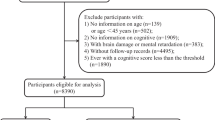Abstract
With the aging of the population, China has a large population base. The number of people suffering from mild cognitive impairment has gradually increased and gradually turned to senile dementia. The probability of mild cognitive impairment in China is about 5–7%, and about 15 million people are ill. To better distinguish mild cognitive impairment from Alzheimer’s, this paper adopted the machine learning (ML) method to model. The evaluation table was established by considering the reaction time, education, background, memory, and other aspects of the patient. Machine learning has been applied in the fields of the Internet, finance, medicine, automation, biological science, etc. Through the machine learning support vector machine (SVM) and linear regression, the classification accuracy was compared. The results showed that the classification accuracy of SVM was 87.92% under the ML algorithm. It also showed that ML was more conducive to classification and recognition, which has played an important role in the identification of mild cognitive impairment in the current aging population.







Similar content being viewed by others
Data availability
The data that support the findings of this study are available from the corresponding author upon reasonable request.
References
Malhotra R (2019) The aging of a young nation: population aging in Singapore. Gerontologist 59(3):401–410
Mallo SC (2018) Assessing mild behavioral impairment with the mild behavioral impairment checklist in people with mild cognitive impairment. J Alzheimers Dis 66(1):83–95
Anderson ND (2019) State of the science on mild cognitive impairment (MCI). CNS Spectr 24(1):78–87
Baiano C (2020) Prevalence and clinical aspects of mild cognitive impairment in Parkinson’s disease: a meta-analysis. Mov Disord 35(1):45–54
Chandra A, Dervenoulas G, Politis M (2019) Magnetic resonance imaging in Alzheimer’s disease and mild cognitive impairment. J Neurol 266(6):1293–1302
Ismail Z (2017) Prevalence of depression in patients with mild cognitive impairment: a systematic review and meta-analysis. JAMA Psychiatr 74(1):58–67
Taragano FE (2018) Risk of conversion to dementia in a mild behavioral impairment group compared to a psychiatric group and to a mild cognitive impairment group. J Alzheimers Dis 62(1):227–238
Sanford AM (2017) Mild cognitive impairment. Clin Geriatr Med 33(3):325–337
Tangalos EG, Petersen RC (2018) Mild cognitive impairment in geriatrics. Clin Geriatr Med 34(4):563–589
Petersen RC (2019) Predicting progression to mild cognitive impairment. Ann Neurol 85(1):155–160
Weil RS, Costantini AA, Schrag AE (2018) Mild cognitive impairment in Parkinson’s disease—what is it? Curr Neurol Neurosci Rep 18(4):1–11
Nicole TMH (2017) Computerized cognitive training in older adults with mild cognitive impairment or dementia: a systematic review and meta-analysis. Am J Psychiatr 174(4):329–340
Michaud TL (2017) The risk of incident mild cognitive impairment and progression to dementia considering mild cognitive impairment subtypes. Dement Geriatr Cogn Disord Extra 7(1):15–29
Albert M (2018) Predicting progression from normal cognition to mild cognitive impairment for individuals at 5 years. Brain 141(3):877–887
Viggiano D (2020) Mild cognitive impairment and kidney disease: clinical aspects. Nephrol Dial Transpl 35(1):10–17
Hoogland J (2017) Mild cognitive impairment as a risk factor for Parkinson’s disease dementia. Mov Disord 32(7):1056–1065
Sherman DS (2017) The efficacy of the cognitive intervention in mild cognitive impairment (MCI): a meta-analysis of outcomes on neuropsychological measures. Neuropsychol Rev 27(4):440–484
Beishon L (2017) Cerebral hemodynamics in mild cognitive impairment: a systematic review. J Alzheimers Dis 59(1):369–385
Asgari M, Kaye J, Dodge H (2017) Predicting mild cognitive impairment from spontaneous spoken utterances. Alzheimer’s Dementia Transl Res Clin Interventions 3(2):219–228
Snitz BE (2018) Risk of progression from subjective cognitive decline to mild cognitive impairment: the role of the study setting. Alzheimers Dement 14(6):734–742
Author information
Authors and Affiliations
Corresponding author
Ethics declarations
Conflict of interest
There is no potential conflict of interest in our paper, and all authors have seen the manuscript and approved to submit it to your journal. We confirm that the content of the manuscript has not been published or submitted for publication elsewhere.
Additional information
Publisher's Note
Springer Nature remains neutral with regard to jurisdictional claims in published maps and institutional affiliations.
Rights and permissions
Springer Nature or its licensor (e.g. a society or other partner) holds exclusive rights to this article under a publishing agreement with the author(s) or other rightsholder(s); author self-archiving of the accepted manuscript version of this article is solely governed by the terms of such publishing agreement and applicable law.
About this article
Cite this article
Li, H. Identification of Mild Cognitive Impairment by Machine Learning Algorithm. Neural Comput & Applic 35, 25121–25130 (2023). https://doi.org/10.1007/s00521-023-08489-x
Received:
Accepted:
Published:
Issue Date:
DOI: https://doi.org/10.1007/s00521-023-08489-x




